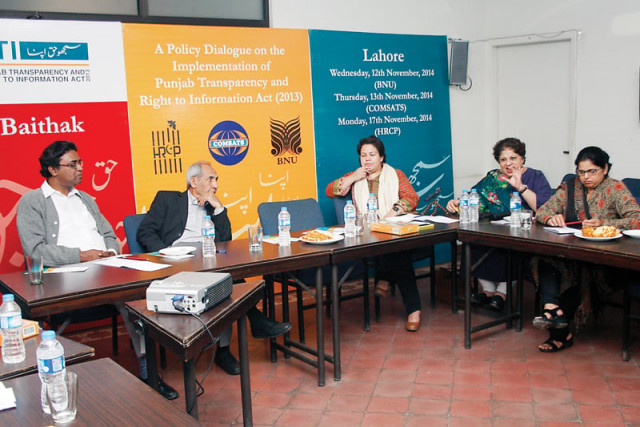Right to information: Implications of new law worry experts
‘If someone is denied information in India, they say we will RTI you’.

Between bouts of optimism and scepticism regarding the Punjab Transparency and Right to Information Act 2013, speakers at a policy dialogue on Monday concluded that there was still a lot of room to raise awareness regarding the law.
The Right to Information Baithak was organised by the Beaconhouse National University at the Human Rights Commission of Pakistan auditorium. Speakers discussed the RTI’s implications for minorities in the country.
The speakers called upon educational institutions and groups advocating transparency to take the lead in raising awareness regarding the right to information.
Wajahat Masood, an instructor at the School of Media and Mass Communication at BNU and moderator for the session, said there was a lack of sensitisation regarding issues pertaining to minorities. He said the system had been structured in a way so as to maintain anonymity. A lack of understanding and empathy by the society, made it worse, he said. “Liberalism isn’t defined by what you eat, drink or wear. It is what you think. Unfortunately, we fail to understand the difference.”
Shahid Ataullah, a columnist, said that the RTI Act was a powerful yet blunt weapon. It effectively allows the government to silence people without actually empowering them, he said.
Ataullah said if properly exercised, the law could empower people by allowing them to question the government. “But an uncooperative attitude makes it difficult to make the legislation effective.”
He said the disparity extended to the right and access to education. Ataullah spoke about various educational institutions and examinations that required students to identify their faith and declare whether they were from the Ahmadiyya community. “What does that have to do with children’s access to education?”
Mian Ishaq, a former banker speaking for the Ahmadiyya community, spoke about the difficulties they faced in obtaining permission for religious gatherings. He said that left them wondering who to approach to address their concerns. “Instead of asking for equal footing as citizens, we now scramble for space to breathe.”
Tanveer Jahan, executive director of the Democratic Commission for Human Development, said that the society was polarised – especially pertaining to matters of faith. Recalling the incidents at Joseph Colony, Shanti Nagar and Gorja, she said the public was still unaware of what had transpired.
“Pakistan is over-legislated,” she said, expressing reservations over how laws were formed. “We legislate first and then work on how to improve the laws.”
But despite the many challenges, she said, precedence of implementation of law was essential to empower people.
Former National Commission for Justice and Peace director Peter Jacob said issues pertaining to religious discrimination affected minorities on a daily basis. He said he hoped that the RTI Act and the Punjab Information Commission could help address issues of disparity for minorities.
Irum Touqeer, representing the World Bank, said the law was in place, what remained were initiatives to educate people on how to ask for the information they required.
Awareness regarding the RTI law in India has reached a point where people know how to use it. “There, if people are denied information, guaranteed to them under law, they simply say we will RTI you.” India passed its RTI Act in 2005.
Naazish Attaullah, a senior fellow at the School of Visual Arts and Design at BNU, recommended taking awareness sessions to a larger audience. She suggested engagement through conventional and social media and targeting the youth.
“We can form pressure groups to take up individual cases that held implications for subjugated communities.”
Saad Malik, a lecturer at BNU’s School of Computer and IT, said it was also important to work on the delivery of information in a language free of jargon which allowed citizens to understand them.
Published in The Express Tribune, November 18th, 2014.



















COMMENTS
Comments are moderated and generally will be posted if they are on-topic and not abusive.
For more information, please see our Comments FAQ